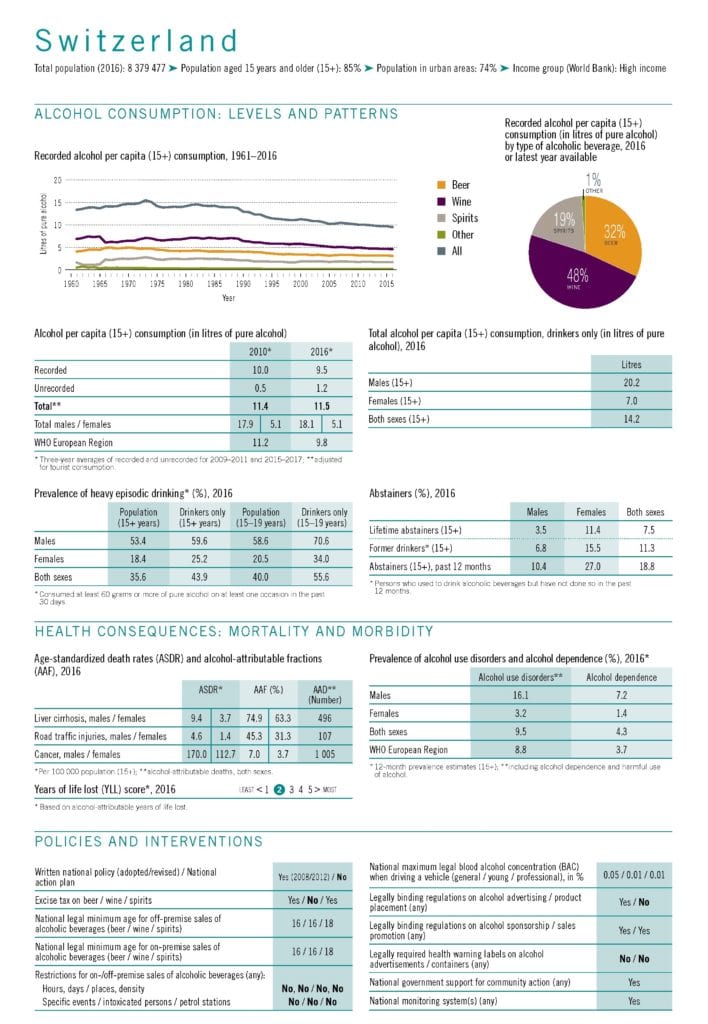Overall alcohol consumption declined in Switzerland during the pandemic, finds a new study by the Addiction Switzerland Foundation on behalf of the Federal Office of Customs and Border Security (OFDF).
The study was conducted to examine changes in alcohol consumption as a result of the measures taken to contain the spread of COVID-19 in Switzerland. Researchers obtained data from a representative sample of about 2000 Swiss aged 15 and older. The participants were interviewed during the summer of 2021 about their alcohol consumption and purchases. The analysis then compared the twelve-month period before the introduction of COVID-19 counter-measures in mid-March 2020 and the twelve-month period after their implementation.
The results show:
- Alcohol use declined by 2.6 standard units of alcohol per month, per person.
- This is a decrease of 7.7% in alcohol use in the general population.
- Binge alcohol use decreased by 17%.
According to the study, those who decreased their alcohol use cited reduced opportunity to use alcohol and health concerns as the major reasons for their change.
As Movendi International reported previously, already in the early stages of the pandemic in 2020, there was a collapse in alcohol sales in Switzerland.
Alcohol-free campaigns, such as Dry January, could be one reason for the decline in Swiss alcohol use. Last year, Switzerland launched its first-ever Dry January campaign. The campaign was organized by the Blue Cross, the innovation platform “staatslabor” and the “Groupement Romand d’Etudes des Addictions”. It was a massive success with a representative study showing that 14% of Swiss adults or about 1 million people in Switzerland chose to stay alcohol-free in January.
The study notes a polarization in alcohol use
However, the researchers note that there is a polarization in alcohol use in Switzerland, as has been observed in other countries during COVID-19 as well. While alcohol use declined in some population sub-groups, there are other groups where alcohol use increased.
For example, concerning at-home alcohol use, the study found that 16% of respondents reduced their alcohol use. But 17% of respondents increased their alcohol use at home.
Those who increased using alcohol at home were adolescents and young adults (up to about 44 years). Alcohol consumption declined in older adults.
Furthermore, the number of young people between 15 to 24 years of age who stay alcohol-free has increased. At the same time, among youth in the same age group who are consuming alcohol, alcohol consumption has further increased.
The study further identified groups with higher risk alcohol use patterns. These groups are especially vulnerable to alcohol harm. They cite concerning reasons for alcohol use, such as relaxing from depression and also forgetting problems. These are concerning reasons for alcohol consumption, because using alcohol as coping tool for mental health increases the risk of developing alcohol use disorder and addiction.
People with this high-risk alcohol use include those whose economic situation has deteriorated, those who are afraid of COVID-19, and parents of young children.
Alcohol harm and policy in Switzerland
The World Health Organization (WHO) reports that total per capita alcohol consumption in Switzerland is 11.5 liters. This is above the average alcohol consumption in the WHO European region – the heaviest alcohol consuming region in the world. Men particularly consume very high amounts of alcohol. Males above 15 years of age who use alcohol consume 20.2 liters per capita per year.
Binge alcohol use among young people (15 to 19 years) who use alcohol is also high, with over half (55.6%) engaging in this high-risk behavior. Here as well, boys who use alcohol binge more with over two-thirds (70.6%) reporting this type of high-risk consumption.
Young people are specifically at harm from the products and practices of the alcohol industry in Switzerland. As Movendi International reported, Swiss youth encounter alcohol stimuli every 5 minutes as they go about their daily lives. Half of all these stimuli were advertisements or sales promotions.
That also means there is urget need to better protect children, youth and the general population from the harm caused by the alcohol industry. Swiss alcohol policies have significant potential to be improved further. As the WHO reports, alcohol remains easily and widely available. Switzerland lack public health oriented limits for on or off-premise alcohol sales.
Switzerland also lacks public health oriented alcohol taxation. There is also no excise tax on wine, an alcohol product which Swiss youth can purchase and consume as young as 16 years of age.
Reducing the availability of alcohol and increasing prices of alcohol products through excise taxes are two of the three best buy alcohol policy solutions recommended by the WHO.
Sources
Addiction Switzerland Foundation: “Alcohol and pandemic: slight decline in consumption in general, changes in habits especially in vulnerable groups“
SWI swissinfo.ch: “Swiss drank less alcohol during pandemic“
